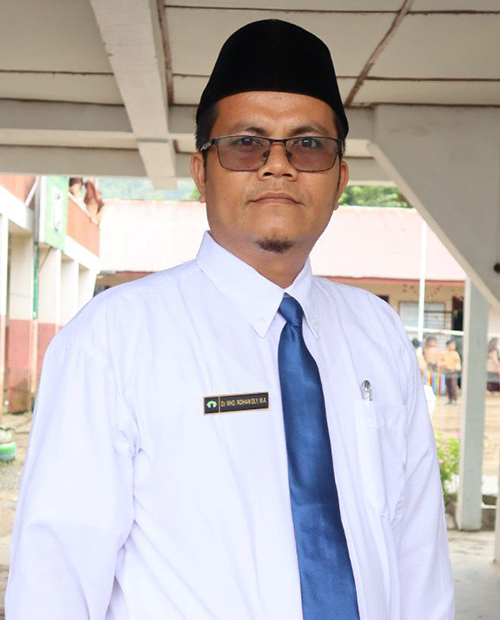Optimization of Student Learning Activities of SMA Negeri 1 Pulau Banyak in Islamic Education Learning through the STAD Type Cooperative Model
DOI:
https://doi.org/10.62945/jcii.v1i1.23Keywords:
Islamic religious education, STAD cooperative learning model, learning outcomesAbstract
This study aims to improve student learning outcomes in Islamic Religious Education subjects on the material of Islamic Law on Maintaining Honesty as a Reflection of Personality through the application of the Student Teams Achievement Division (STAD) cooperative learning model. This study is a classroom action research that uses four steps, namely planning, action, observation and reflection. The subjects of this study were class IX of SMA Negeri 1 Pulau Banyak, Aceh Singkil Regency, in the 2023/2024 academic year. The data for this study were obtained using test and observation techniques. Tests are used to measure learning outcomes and observations are used to analyze teacher and student learning activities. The results of the study showed that there was a significant increase in student learning completeness after the implementation of the STAD learning model. Before the implementation of the STAD model, the level of student learning completeness only reached 13.04%. After cycle I, completeness increased to 73.91%, and in cycle II it reached 95.65%. These findings prove that the application of the STAD type cooperative learning model is effective in improving student learning activities and outcomes, especially in understanding and applying the values of honesty as part of the character that must be possessed. Thus, the STAD model can be used as a relevant learning strategy in teaching Islamic Religious Education at the secondary school level.
Downloads
References
Arikunto, S. (2002). Prosedur Penelitian. Bandung: Rineka Cipta.
Dasopang, M. D., Lubis, A. H., & Dasopang, H. R. (2022). How do Millennial Parents Internalize Islamic Values in Their Early Childhood in the Digital Era? AL-ISHLAH: Jurnal Pendidikan, 14(1), 697–708.
Dasopang, M. D., Nasution, I. F. A., & Lubis, A. H. (2023). The Role of Religious and Cultural Education as A Resolution of Radicalism Conflict in Sibolga Community. HTS Theological Studies, 79(1), 1–7.
Erawadi, E., Hamka, H., & Juliana, F. (2017). The Analysis of Student’s Stressed Syllables Mastery at Sixth Semester of TBI in IAIN Padangsidimpuan. English Education: English Journal for Teaching and Learning, 5(1), 44–57.
Fatimah, A., & Maryani, K. (2018). Visual Literasi Media Pembelajaran Buku Cerita Anak. Jurnal Inovasi Teknologi Pendidikan, 5(1), 61–69. https://doi.org/10.21831/jitp.v5i1.16212
Gogahu, D. G. S., & Prasetyo, T. (2020). Pengembangan Media Pembelajaran Berbasis E-Bookstory untuk Meningkatkan Literasi Membaca Siswa Sekolah Dasar. Jurnal Basicedu, 4(4), 1004–1015.
Hamka, H. (2023). The Role of Principals on Teacher Performance Improvement in a Suburban School. QALAMUNA: Jurnal Pendidikan, Sosial, Dan Agama, 15(1), 371–380.
Hamka, H., Suen, M.-W., Anganthi, N. R. N., Haq, A. H. B., & Prasetyo, B. (2023). The Effectiveness of Gratitude Intervention in Reducing Negative Emotions in Sexual Abuse Victims. Psikohumaniora: Jurnal Penelitian Psikologi, 8(2), 227–240.
Harahap, S. M., & Hamka, H. (2023). Investigating the Roles of Philosophy, Culture, Language and Islam in Angkola’s Local Wisdom of ‘Dalihan Na Tolu.’ HTS Teologiese Studies/Theological Studies, 79(1), 8164.
Hendrawati, S., Rosidin, U., & Astiani, S. (2020). Perilaku hidup bersih dan sehat (PHBS) siswa/siswi di sekolah menengah pertama negeri (SMPN). Jurnal Perawat Indonesia, 4(1), 295–307. https://doi.org/https://doi.org/10.32584/jpi.v4i1.454
Lubis, A. H. (2019). Upaya Peningkatan Hasil Belajar Siswa Sekolah Dasar melalui Model Cooperative Learning Tipe Numered Heads Together. FORUM PAEDAGOGIK, 11(2), 127–143.
Lubis, A. H. (2023). The Interactive Multimedia Based on Theo-Centric Approach as Learning Media during the Covid-19 Pandemic. JPI (Jurnal Pendidikan Indonesia), 12(2), 210–222.
Lubis, A. H., & Dasopang, M. D. (2020). Pengembangan Buku Cerita Bergambar Berbasis Augmented Reality untuk Mengakomodasi Generasi Z. Jurnal Pendidikan: Teori, Penelitian, Dan Pengembangan, 5(6), 780–791.
Lubis, A. H., Dasopang, M. D., Ramadhini, F., & Dalimunthe, E. M. (2022). Augmented Reality Pictorial Storybook: How does It Influence on Elementary School Mathematics Anxiety? Premiere Educandum: Jurnal Pendidikan Dasar Dan Pembelajaran, 12(1), 41–53.
Lubis, A. H., & Wangid, M. N. (2019). Augmented Reality-assisted Pictorial Storybook: Media to Enhance Discipline Character of Primary School Students. Mimbar Sekolah Dasar, 6(1), 11–20. https://doi.org/10.17509/mimbar-sd.v6i1.16415
Lubis, A. H., Yusup, F., Dasopang, M. D., & Januariyansah, S. (2021). Effectivity of Interactive Multimedia with Theocentric Approach to the Analytical Thinking Skills of Elementary School Students in Science Learning. Premiere Educandum: Jurnal Pendidikan Dasar Dan Pembelajaran, 11(2), 215–226.
Manshur, U., & Ramdlani, M. (2019). Media audio visual dalam pembelajaran PAI. Al-Murabbi:Jurnal Pendidikan Agama Islam, 5(1), 1–8.
Mardhiyah, R. H., Aldriani, S. N. F., Chitta, F., & Zulfikar, M. R. (2021). Pentingnya Keterampilan Belajar di Abad 21 sebagai Tuntutan dalam Pengembangan Sumber Daya Manusia. Lectura: Jurnal Pendidikan, 12(1), 29–40.
Ningsih, Y. S., Mulia, M., & Lubis, A. H. (2023). Development of Picture Storybooks with TheoAnthropoEco Centric Approach for Elementary School Students. AL-ISHLAH: Jurnal Pendidikan, 15(2), 1888–1903.
Nurhidayah, I., Asifah, L., & Rosidin, U. (2021). Pengetahuan , Sikap dan Perilaku Hidup Bersih dan Sehat pada Siswa Sekolah Dasar. 13(1), 61–71. https://doi.org/10.32528/ijhs.v13i1.4864
Pebtiyanti, I., Ahmad, A., Dzaky, M., Fauziah, S. N., Rendi, & Puspitasari, P. (2023). Peran kurikulum merdeka dalam meningkatkan harmonisasi antara masyarakat dan sekolah. Jurnal Pacu Pendidikan Dasar, 3(1), 269–277. https://doi.org/https://doi.org/10.22021/pacu.v3i1.411
Rahmah, S., & Lubis, A. H. (2024). Problem Posing as a Learning Model to Improve Primary School Students’ Mathematics Learning Outcomes in Gayo Lues. Journal of Indonesian Primary School, 1(4), 93–104.
Rahman, A., Munandar, S. A., Fitriani, A., Karlina, Y., & Yumriani. (2022). Pengertian Pendidikan, Ilmu Pendidikan dan Unsur-Unsur Pendidikan. Al Urwatul Wutsqa: Kajian Pendidikan Islam, 2(1), 1–8.
Ranisa, R., Erawadi, E., & Hamka, H. (2018). Students’ Mastery in Identifying Adverbs at Grade VIII SMPN 2 Batang Toru Tapanuli Selatan. ENGLISH EDUCATION JOURNAL: English Journal for Teaching and Learning, 6(2), 241–252.
Ricardo, R., & Meilani, R. I. (2017). Impak Minat dan Motivasi Belajar terhadap Hasil Belajar Siswa. Jurnal Pendidikan Manajemen Perkantoran (JPManper), 2(2), 188–201.
Santi, Undang, & Kasja. (2023). Peran Guru PAI dalam Membentuk Karakter Peserta Didik di Sekolah. Jurnal Pendidikan Tambusai, 7(2), 16078–16084. https://doi.org/https://doi.org/10.31004/jptam.v7i2.8918
Sugiyono. (2018). Metode Penelitian Kuantitatif Kualitatif dan R&D. Bandung: Alfabeta.
Downloads
Published
Issue
Section
License

This work is licensed under a Creative Commons Attribution-ShareAlike 4.0 International License.










